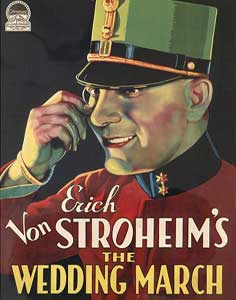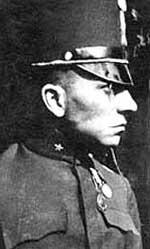 Erich von Stroheim both directed & starred in the silent film Blind Husband (1919), his first directorial effort. He plays an Austrian officer staying at an inn, where he attempts to seduce the bored & unhappy wife of a physician who takes her for granted.
Erich von Stroheim both directed & starred in the silent film Blind Husband (1919), his first directorial effort. He plays an Austrian officer staying at an inn, where he attempts to seduce the bored & unhappy wife of a physician who takes her for granted.
Except for Stroheim's inherently odd screen presence, the film is a fairly ordinary & moralistic romance of a woman rediscovering her marriage after a period of being ignored by her husband & finding herself getting attention elsewhere.
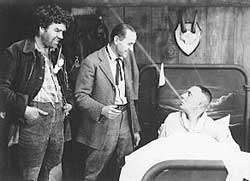 Her husband & the Austrian officer who tempts the married woman go mountain climbing together. Her husband & the Austrian officer who tempts the married woman go mountain climbing together.
This expedition becomes perilous & the two men must rely on one another for their very lives. This provides the film's real moments of tension, as it would be a good opportunity to get away with murder.
In its day this was a commercial success & got Stroheim off to a grand start as a Hollywood writer-director. But his increasingly eccentric behavior too soon undermined all power gained by having started off as a money-maker.
In & of itself Blind Husband is not all that interesting a film, but if compared to other films of 1919, there's a degree of realism uncommon (though by no means absent) from silent cinema of the 'teens.
Less than a decade later Stroheim made what would be his last directorial effort, after which he was lucky just to remain employed as an actor. It's a matter of speculation what he might have done if his intended career as director had lasted into the sound era.
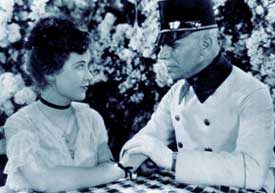 The Wedding March (1928) produced, co-written, & directed by Erich Von Stroheim begins with the legend "O Love, without thee, marriage is a sacrilege & mockery!" assuring us he's still on a moralistic jag. The Wedding March (1928) produced, co-written, & directed by Erich Von Stroheim begins with the legend "O Love, without thee, marriage is a sacrilege & mockery!" assuring us he's still on a moralistic jag.
Because Stroheim was a difficult personality who refused to adhere to a budget, he was rarely fully able to make the films he wanted to make. Although The Wedding March per se appears to be precisely the film he intended, it was supposed to be the first third of an epic trilogy, & that was not to be.
The Wedding March alone was completed. It's immediate sequel The Honeymoon was begun but Stroheim was fired for truly extravagant cost overruns. His investor took the unfinished bits & had them edited into something sufficiently complete to be released in Europe, but no copy is known to survive. The third part was never filmed at all.
In consequence we do not have the intended epic tale of romance & sorrow of the city where Stroheim was born. But what we do have is a complete work in itself, & the best example of what Stroheim seriously intended to achieve if never interferred with by studio heads & bankrollers.
We're introduced to the city of Vienna with exterior shots of a bustling city. We soon meet two middle-aged aristicrats in their bedroom, arguing with a high degree of venom, an ugly couple who apparently hate each other.
Their son Nicki (Stroheim) is a layabout. He's used to living a rich life but the fact is it's a new age & unlanded aristocracy have tended to fall into penury; he can expect no inheritence.
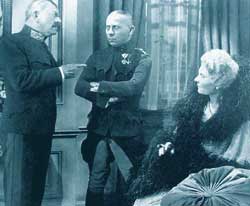 At a Viennese festival, he encounters & falls in love with a beautiful but impoverished peasant maiden, Mitzi (Fay Wray, still a teenager, in her first important role). Startlingly, part of the festival parade is presented in a rare early example of two-strip technicolor. Unfortunately it is only a dull military parade. At a Viennese festival, he encounters & falls in love with a beautiful but impoverished peasant maiden, Mitzi (Fay Wray, still a teenager, in her first important role). Startlingly, part of the festival parade is presented in a rare early example of two-strip technicolor. Unfortunately it is only a dull military parade.
Stroheim was often enough tricked out in military drag in his films (he wears pretty much the same military costume in both Blind Husband & Wedding March) that one must suppose such costuming was a bit of a fetish for him, so he went all out with military clothing up the wazoo & in color.
Mitzi & Nicki's whirlwind romance gets fairly explicit. Their loving apple blossom tryst has its sincerity contradicted both by Nicki having had an earlier tryst in the same location with Cecelia (Zasu Pitts), while the tryst's purity is contradicted when intercut with scenes of a decadent pagan-inspired Viennese orgy, there not yet being a Hayes Code encouraging filmmakers to self-censor.
Had he married Mitzi they might both have lived happily ever after, or we're supposed to think so. I wasn't personally convinced Nicki would ever change his womanizing & lazy life, & Mitzi could only have had a different kind of miserable life.
Due to Nicki's unwillingness to live within his minimal means, he consents to an arranged marriage with the crippled heiress Cecelia, daughter of lowborn but successful merchants. The parents are hideous social climbers, but Cecelia is a good soul caught in the cruel machinations of society.
Nicki does not love this woman who limps about morose for being maltreated by her parents. She is at first won over by Nicki's gallantry, but we can see she will in the long run suffer greatly due to the the injustice of this mismatch.
Meanwhile the brokenhearted Mitzi appears apt to be married off to a cruel meat butcher (Mathew Betz), whose foul breath & filthy kisses make her spit his tabacco drool out of her mouth in horror. He knows she carries a torch for Nicki & thus becomes increasingly brutish, all but raping her in a pig stye.
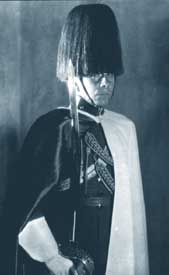 At Nicki's & Cecelia's wedding, the hands of Death can be seen playing the wedding march on the organ, & Cecelia limps down the aisle unutterably pitiful. Mitzi is in the street outside the cathedral, in the rain, when the vicious butcher turns up with the idea of killing the man who still holds her affections. It's a fierce conclusion, the lavishly staged wedding becoming a backdrop to menace. At Nicki's & Cecelia's wedding, the hands of Death can be seen playing the wedding march on the organ, & Cecelia limps down the aisle unutterably pitiful. Mitzi is in the street outside the cathedral, in the rain, when the vicious butcher turns up with the idea of killing the man who still holds her affections. It's a fierce conclusion, the lavishly staged wedding becoming a backdrop to menace.
This is a good film but perhaps not as perfect as some film historians would have it. Many think of Stroheim as an abused genius akin to Orson Welles, who would've made many brilliant films if investors & studios could've understood his visionary promise & been willing to pay the price of fine art.
I've never been convinced of this. Stroheim as a filmmaker was unmanned by his own self-importance & vanity. The Wedding March would've been much better with a handsome & sympathetic lead. Beady-eyed Stroheim just naturally looks like a psychotic soldier.
That his romance with Mitzi is credible is due more to Fay Wray's excellent performance than Stroheim's, as it's entirely believable that a beautiful romantic girl would fall head over heals for a weirdo who'll do her wrong. Girls do it all the time, luckily for weirdos.
Stroheim would've been better cast as the brutish butcher, who as played is a caricature rather than a human being & needed to be humanized at least a little, as Stroheim might've done in the role. But vanity would not permit this; he had to be the heroic lead.
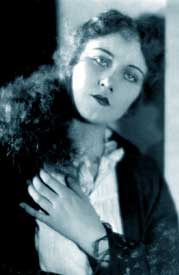 So it would seem that whenever he was teased with moments of complete control over his projects, he became tediously moralistic, & attempted to upraise himself as a leading man instead of the character-player he was so much more suited for. So it would seem that whenever he was teased with moments of complete control over his projects, he became tediously moralistic, & attempted to upraise himself as a leading man instead of the character-player he was so much more suited for.
As a director he gets tremendous performances out of Fay Wray & Zasu Pitts, but he could not direct himself. Since there's no evidence he would ever have stood back from his desire for star status, there's really no reason to suppose that if he'd had full leeway over a longer period of time that he would've made many great films.
Rather, he'd've made his films longer & more tedious with himself in more scenes. There's nothing in the manner of his presentation that suggests truly great cinematic genius undermined by his employers. He had himself to blame for the undermining, & not just from his eccentricity, but from the nature of the work itself, as The Blind Husband & The Wedding March are certainly wholly his own.
Nevertheless, as a product among other silent film products of the time, The Wedding March is entirely effective, a sinister anti-love story, very powerful for characterization especially of the two women. It presents itself as a warning to all who would place the importance of wealth ahead of the importance of love, & that sort of browbeating could've been subtler.
The possibility of seeing more of Zasu Pitts in the lost sequel is certainly a tragedy, as she is superb throughout, & most especially so in those closing realizations that her marriage is a fraud.
copyright © by Paghat the Ratgirl
|
